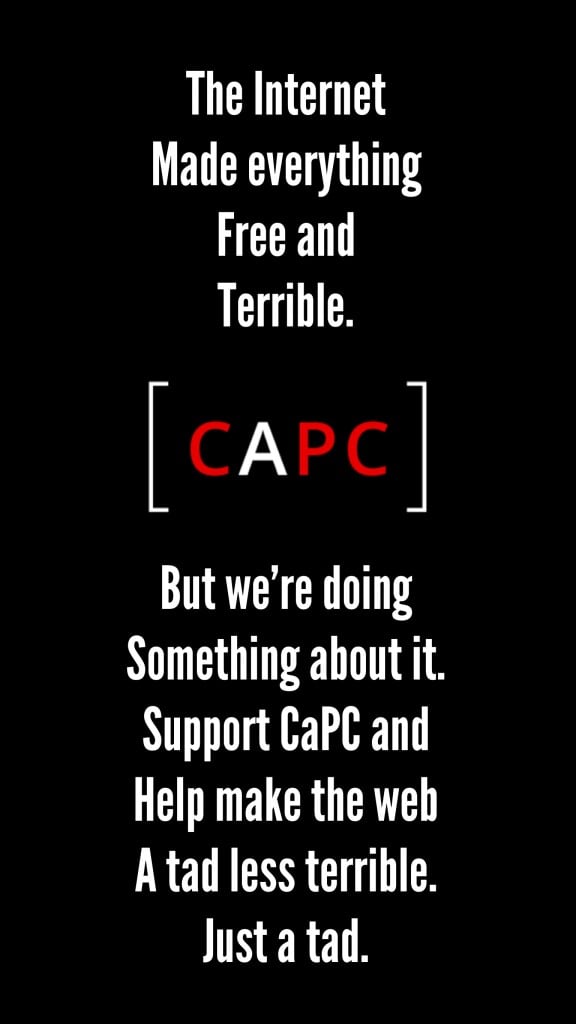 by Alan Noble
by Alan Noble
The following is an exclusive feature that has been shared with you but is otherwise available only in Issue #4 of the Christ and Pop Culture Magazine. For more features like this, download our app for iPad and iPhone from Apple’s App Store.
After a one-week free trial, monthly and yearly subscriptions are available for $2.99 and $29.99 respectively. New issues are made available every other week. More information here.

“In the past forty years or so, the American family has come under stress. Relatively more American children are being raised in the adverse environments that produce less educated and less skilled individuals and persons more likely to commit crime and participate in socially deviant behavior.” (Heckman, Productivity 33)
“A divide is opening up in American society. Those born into disadvantaged environments are receiving relatively less stimulation and resources to promote child development than those born into more advantaged families.” —Heckman (14)
At a recent conference, noted sociologist Robert Putnam revealed some alarming findings from his current research project on socioeconomic disparity. He found that if you take class into account, there is increasingly less difference of opportunities between races, which is good news. The bad news is that there is a far wider gap between the upper and lower classes, particularly in the attention and care they give to their children. Where the upper classes are giving significantly more time, attention, and money to their children than in the past, the poor have only shown moderate increases. Children in the lower classes are receiving less and less of the crucial opportunities needed to grow, learn, and mature compared to their upper class counterparts.
According to Putnam, what this means is that the United States will increasingly have a social mobility problem—and a deeply serious one: “Solving this problem will be costly; not solving it will be even costlier. If success in life comes to depend upon how well you choose your parents our country will pay a massive economic price for writing off about a third of our workforce. And morally, such a system is simply unfair.”
As these kids enter, or try to enter, the job market, the United States will find itself struggling with a large unskilled workforce. Without adequate skills to get a good job, we can anticipate higher rates of crime, unemployment, teen pregnancies, single mothers, abortions, and a myriad of other social ills which are strongly correlated with poverty. Whether or not President Obama brings us out of our current economic crisis, prevents Iran from gaining and using nuclear weapons, or solves the health care problem, unless something dramatic is done to address this disparity, the United States will be faced with a defining crisis. And where will the Church be while this crisis builds?
One of Putnam’s most interesting findings is that children from working class families no longer tend to be involved with churches. This wasn’t always the case. In the recent past, Putnam claims, “There were no class differences in religious observance in America, but now attending church among the [working class] in America has collapsed,” where as for upper-middle class it has “not changed much.”
Putnam sees this as a serious problem, because without the involvement of churches, many of these kids will not receive the attention and opportunities that are important for social mobility. Putnam claims that churches (along with every other major social institution) have failed working class children, creating a generation that is alienated, untrusting, and unskilled. The church has abandoned the poor, he says, and the results are tragic.
As bleak as this picture is, I’d like to suggest that the Church in the United States holds a critical position in our society to potentially bless our communities in dramatic ways. With the tremendous emphasis evangelicals place upon the family unit as the moral center of our country, the Church in the United States could be a leader in preventing a major societal conflict by promoting and engaging in early childhood intervention.
An interesting approach to this crisis comes from a Nobel Prize winning economist at the University of Chicago, Professor James Heckman. His solution is called the Heckman Equation.
On the surface, the Heckman Equation feels a bit like a mix between totalitarian social engineering and a fad diet, but it’s based on rigorous research and some fairly common-sense principles.
Professor Heckman has studied how early childhood interventions (specifically of disadvantaged youths, but presumably some of these results would appear for non-disadvantaged children) affect students. Heckman’s focus was on the effects of cognitive and noncognitive skills, which include things like “motivation, socioemotional regulation, time preference, personality factors and the ability to work with others” (10). What he found was that early childhood interventions that focus on both kinds of skills dramatically improve the children’s lives in a number of areas:
- Reduce criminal participation later in life
- Increase educational achievement in minorities and children in adverse home environments (poverty, single parents, etc.)
- Reduce disparity between black-white incarceration rates by increasing the likelihood that black students complete more years of schooling (which lowers the probability of incarceration)
- Raise future wages
- Increase college attendance
- Increase economic returns from their education
- Lower rates of teenage pregnancy
- Mothers give more cognitive and emotional stimulation for their children—which prepares them to be successful
- Reduces race and income gaps
Essentially every major societal ill, and every major concern for conservatives and Christians, can be traced in some way back to the quality of the first five years of life.
Heckman’s summary of these findings is that “skills beget skills.” Those with good cognitive and noncognitive skills when entering kindergarten are able to build on them to gain more skills. Those without face a much graver challenge:
Skills beget skills and capabilities foster future capabilities. All capabilities are built on a foundation of capacities that are developed earlier. This principle stems from two characteristics that are intrinsic to the nature of learning: (a) early learning confers value on acquired skills, which leads to self-reinforcing motivation to learn more and (b) early mastery of a range of cognitive, social, and emotional competencies makes learning at later ages more efficient and therefore easier and more likely to continue. (21)
A lot of this seems like common sense. If you can delay your gratification and persevere through challenging tasks as a young child, you will be much more successful in elementary school, you will be more likely to pick up additional skills, which better prepares you for high school, which in turn increases the likelihood that you will attend college, get a good job, remain a law-abiding citizen, provide a safe and nurturing environment for your children, and give them the same opportunities you had to be successful.
 Skills beget skills over a person’s lifetime, but also multiply through the next generation. If you had good noncognitive skills as a kid, you’re going to be much more likely to give your children the same skills. And conversely, if you were neglected during your first five years of life, you are much, much more likely to do the same with your children. Generational poverty and poor social mobility probably has a lot to do with how parents care for their very young children.
Skills beget skills over a person’s lifetime, but also multiply through the next generation. If you had good noncognitive skills as a kid, you’re going to be much more likely to give your children the same skills. And conversely, if you were neglected during your first five years of life, you are much, much more likely to do the same with your children. Generational poverty and poor social mobility probably has a lot to do with how parents care for their very young children.
That “noncognitive” skills have a dramatic impact on a person’s success in life is not surprising to conservatives or Christians (or anyone, I hope). Christians have been complaining about the deterioration of character and morals in our country for decades. And we have known that character forming must begin at home, which is why conservatives have traditionally stressed the importance of the family unit and been suspicious of State attempts at developing “citizenship” skills in the public schools.
Heckman’s solution is voluntary, early childhood intervention (ECI) programs for disadvantaged youths. These programs have been shown to produce dramatic results at a fraction of cost of interventions later in life. If you invest one dollar in ECI, you receive eight dollars back, according to Heckman’s analysis. Compare that with investments later in life, like GED programs, tutoring, and the like, and you’ll find that ECI is an extremely valuable investment for communities.
There’s just one, significant drawback to Heckman’s recommendation: Once these programs are scaled up to the State or Federal level, there will be a large loss in efficiency. Heckman shows that even when these programs are scaled up, they will continue to save us money and improve the quality of our communities. But ideally, voluntary, early childhood interventions would be run by local organizations, ones that can keep costs down, better meet the needs of particular communities, and build more meaningful relationships with disadvantaged youths and their families. Perhaps a community of people who were specifically called to care for orphans, to look out for the interests of our neighbors, to care for the poor and needy, could work to fulfill this need.
We are quick to speak out against ineffective, overreaching, dehumanizing government social programs, but slow to do the God-commanded work of meeting those needs ourselves. I understand that in many areas the State has worked to force the Church out of social work (one can think of Catholic adoption agencies that have been shut down for refusing to allow homosexuals to adopt kids), but that hardly accounts for the disproportionate passion that Christians in the United States have for objecting to the State helping the poor as opposed to following Christ’s commands to do so. Well, here’s an opportunity for the Church to make a dramatic positive impact in local communities, thereby decreasing the need for State intervention, increasing our witness to the World, meeting real and serious needs, and (most important) obeying our obligations to Christ and our neighbor.
If local churches worked together to offer early childhood intervention programs, they would be more cost effective, but they would also be caring for the needy in more meaningful, intimate, and personal ways. And through this, they will be able to better proclaim the Gospel.
Practically, this might begin with free or low cost daycare for low income church members and then expand to target low income neighborhoods in general.
Consider this: According to Heckman, the best ECI programs involve in-home training for parents. Workers visit the home regularly to talk with parents and teach them how to interact with their kids in nurturing ways. For churches that run such programs, home visits would allow Christians to forge intimate relationships with those with the greatest need in their communities.
Remember Putnam’s concern: The Church is no longer an active part of the lives of the poor. By instituting ECI programs, the Church would have many opportunities to reinsert itself into the lives of the needy. It would allow us to enter homes; observe physical, spiritual, mental, and relational needs; build relationships; offer a wide range of assistance; identify abuse; and, Lord willing, share the Gospel.
 The beauty of churches investing in early childhood intervention is that it addresses nearly every major social issue for Christians and conservatives. Take the biggest political/ethical/social issue for most evangelicals and Catholics: abortion. Investing in early childhood interventions has the potential to greatly reduce the number of abortions performed each year by addressing the web of socioeconomic realities that typically lead to or accompany abortions.
The beauty of churches investing in early childhood intervention is that it addresses nearly every major social issue for Christians and conservatives. Take the biggest political/ethical/social issue for most evangelicals and Catholics: abortion. Investing in early childhood interventions has the potential to greatly reduce the number of abortions performed each year by addressing the web of socioeconomic realities that typically lead to or accompany abortions.
These interventions have been shown to lower rates of teenage pregnancies, which could lead to fewer abortions. It’s not hard to see how these programs could reduce teenage pregnancies. The noncognitive skills children develop in their formative years will better prepare them to make good life and family planning decisions in their teens. The ability to delay gratification, for instance, is crucial to choosing not to engage in premarital sex or to do so cautiously.
Statistically, poor women are much more likely to seek an abortion. Although we can’t say that poverty causes abortions, there are many sensible reasons why an economically disadvantaged pregnant woman might seek an abortion. She’s less likely to have the emotional and social support necessary to raise a child. She might fear being unable to provide for the child. She will have a harder time getting job training or the education necessary for social mobility if she has a child. And although none of this makes abortion an ethical decision, they all make it an attractive decision. In so far as early childhood intervention can help reduce the circumstances that make abortion an attractive decision for economically disadvantaged women, it could be a very effective pro-life strategy.
One of the many motives women have for seeking an abortion is the fear that they don’t have the skills necessary to raise a child. The best early childhood intervention programs involve in-home training for parents, where workers visit the home of a student and work with parents on how to nurture their children and help them develop. Programs like this can help create communities where good parenting skills are the norm, and thus the prospect of parenting seems less daunting. In addition, they equip parents with the skills needed to care for their children, which increases the chances of those children being equipped to be parents of their own. Again, skills beget skills.
The principle to take away from the example of ECI’s affect on abortion is that many of our most serious problems in society are caused by complex webs of socioeconomic forces which influence individuals, and that early childhood intervention addresses these complex webs by equipping parents and children with the skills they need to make good life decisions. And this principle has similar effects on poverty, crime, education, and more. Skills beget skills. So when we invest in essential skills early in the lives of children, we will see results throughout their lives.
By investing in and running early childhood intervention programs with in-home visits, the Church in the United States could dramatically affect some of the most crippling problems facing our country while simultaneously fulfilling our duty to care for the poor and needy and to share the Gospel. And we could do all this by working to promote traditionally conservative and Christian ideals:
It equips children with the cognitive and noncognitive skills necessary to be responsible, caring, productive neighbors.
It works alongside and supports families, seeing them as the foundation for a flourishing society.
It reduces nearly every destructive element of society: abortion, crime, substance abuse, unemployment, absent fathers, poor health.
It allows the Church to help those who are unequivocally in need: children. Regardless of what their parents have done or continue to do, these children deserve to be served and loved.
It gives churches an intimate and community-based way to care for the needy.
It respects the needy by treating them as individuals, rather than numbers.
It allows churches to be a faithful presence in the lives of their neighbors.
I am under no illusions about the great costs such programs would entail, but I’d suggest that they are worth it. As Heckman demonstrates, even from a purely self-interested position, these programs are a worthwhile investment because of their tremendous outcomes. But I believe that as Christians, we have a better reason to pursue such programs. We are commanded to care for orphans and widows, the needy and oppressed. And as the opportunity and skill gap continues to widen between classes in our country, we have a great opportunity to fulfill that calling in a way that honors God and blesses our neighbors.
Alan Noble (Co-Founder/Managing Editor/Columnist) is a student and teacher at Baylor University, writing his dissertation on transcendence in 20th century american literature. He and his family attend Redeemer Waco, a PCA church. Alan’s passion is studying how believers can be a faithful presence in culture to the glory of God and the edification of others. In addition to editing, Alan writes his column, Citizenship Confusion for CaPC.
—Follow Alan on Twitter @TheAlanNoble and on Facebook.
—For questions, comments, or interest in speaking engagements please email me at noble.noneuclidean [at] gmail [dot] com.
Illustration courtesy of Seth T. Hahne. Check out Seth’s graphic novel and comic review site, Good Ok Bad.